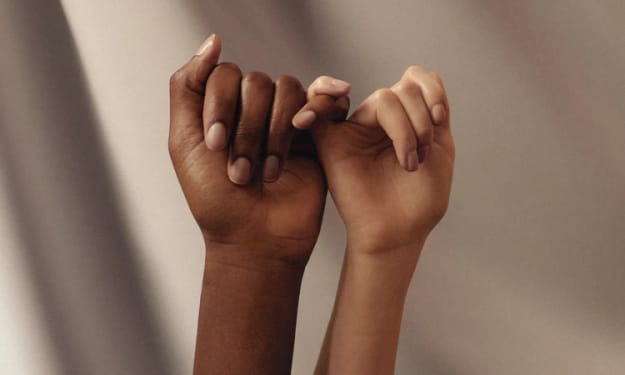A Grassroots Approach to Change
My journey to creating safe and inclusive spaces for BIPOC students.

In my earlier years, I had absolutely no interest in voting. I had experienced leadership under both major political parties in my country, and regardless of which direction the pendulum swang, there was always chicanery involved. The election-induced crime that made me fear leaving home wearing a particular colour only exacerbated the issue. But, as I grew older, I saw the importance of embracing my right to vote. My vote was one of the ways I could amplify my voice, and I learnt that I ought not to take this for granted.
As a fairly new immigrant in Canada, I do not have the voting rights I had back home. However, being the optimist and grassroots activist that I am, I opted to find other ways to contribute to positive change within my community. Ways to transform my voice into action. I may not be able to vote, but there are other things that I can do to create a radical shift. It is a tale as old as time, the use of a grassroots approach to making a difference. In this case, the issue I chose to combat is racism in schools.
The Issues of Racism in Schools
We can all agree that our global society is plagued with numerous issues and challenges, one of which is racism. Racism presents itself in many forms and can be overt or covert with the latter having impacts as adverse as those of the former. In the video below, Natisha and Dallas both expressed the racial discriminations they faced in their respective schools. A mother, Maxine, later shared that her daughter had similar experiences. As a black individual who recently completed my post-secondary studies, I can surely relate. I have faced microaggressions, stereotypes and implicit biases in my day-to-day life but also in an academic environment, so I have a firsthand experience of the challenges that BIPOC (Black, Indigenous and People of Colour) students come across during their studies. These lived experiences, and my commitment to dismantling systems of oppression led me to volunteer in several capacities to address racism and anti-blackness in the education system.
The importance of diversity and inclusivity or lack thereof and their impact on youth in schools is often underestimated. However, a lack of diversity among peers and educators in schools affect students not only academically but also psychologically. Students are more likely to perform better in school if they have a mix of teachers which includes those who share the same racial background. This is known as the role model effect, where this familiarity encourages students to attain a higher level of education for themselves. Since there is that lack of representation for Black and other racialized students, it does not come as a surprise that during the 2016 Statistics Canada General Social Survey, 94% of Black youth aged 15 to 25 said that they would like to get a bachelor’s degree or higher, but only 60% thought that they could. Thoughts like these aren't fueled by just a lack of representation, but also the anti-blackness that presents itself in the education system.
Anti-blackness can cause psychological harm, bullying, self-hatred, othering and feelings of inferiority. This can lead to students not matriculating and can cause a domino effect which leads to unemployment, lower incomes, racial wage gaps and wealth gaps. As such, addressing anti-blackness in the education system is crucial to preventing such negative outcomes for youth. Whether you are a parent, teacher or simply someone who believes that students should be treated fairly in schools, take a look at the Instagram post below created by @educatorsforjustice. The first step to doing anti-racism work of any kind is to acquire a level of awareness through self-education or by listening to the lived experiences of racialized individuals. Social media has a wealth of knowledge and can help you to begin this process, but ensure that your sources are credible and the information you are retaining are only facts.
Making A Change
I am currently employed at a university, and given my goal to eradicate institutional racism, the best place to focus my efforts is in my own backyard. As a result, I pursued a seat at the table on the President's Steering Committee on Equity, Diversity and Inclusion. I have since been asked to become a member of the university's Anti-Racism Task Force, and I happily obliged. These groups are charged with researching, interrogating and addressing structural racism at the university and fostering a community that practices and promotes equity, diversity and inclusion on all counts. Are there any similar committees or groups in your area? If yes, volunteer as well! Even if you're only able to volunteer for a couple of hours each week, your contribution will still have a significant impact. You can even sign a petition, such as the ones in the resource list at the end of the article. These call for the inclusion of Black history and anti-oppression in the Canadian school curricula, and it will take you less than a minute to sign.
Prior to joining the above-mentioned groups, I started the process of creating an award specifically for Black students at my alma mater. While there are numerous awards targeted towards various identities at the university, there are none targeted towards Black students, and I knew this needed to be changed. I am proud to share that the award will be launched in January 2021, and has significant potential for growth! I believe that when possible, we should do what we can to open doors for racialized individuals and pull up an extra seat at the table for them. I encourage you to do so by establishing an award as well, or a more immediate option would be to contribute to awards and scholarships already in existence. Several scholarships were created to bridge the financial gaps that racialized individuals encounter, and I have included two in this article as well. By contributing, you can help a racialized student achieve their educational goals that would have otherwise been challenging or impossible to accomplish.
The most recent addition to my volunteer portfolio is as an Anti-Racism Ambassador for Experiences Canada. This role has been quite fulfilling as it has been an opportunity to work with youth. The importance of this work lies in the fact that the worldviews of youth are shaped as they grow. For that reason, the onus is on us as adults to provide the right messaging to get out ahead of any potential colonial thought processes. In my role as an ambassador, I've had an opportunity to contribute to lesson plans to be used to educate youth about racism and its adverse effects. Additionally, I will be hosting one of six webinars in our Anti-Racism Conversation Series. These webinars are produced in both English and French, and each will feature prominent Canadian Black leaders. Though our primary target audience is youth, anyone is invited to tune in to these conversations. So, if you'd like to learn more about racism in the Canadian context and how it affects the BIPOC community, please join us. The topics of these webinars include justice and security, economic opportunities, health, environment and allyship. If you have children between the ages of 14 and 18, bring them along too!
Black Speaks Victoria
The organisation in which I intend to pour most of my efforts as I move forward is an organisation of my own. I am a co-founder of a small community platform called Black Speaks Victoria, which was founded alongside two equally passionate colleagues experienced in the areas of justice, equity, diversity and inclusion (JEDI) as well as anti-racism. This platform was initially created to amplify Black voices and also shine a light on Black excellence in our community. However, we have recently decided to gratuitously offer workshops on 'how to create inclusive spaces for BIPOC students' targeted at educators.
Though we currently have no funding, we offer these workshops at no cost because we do not want to hear the excuse of 'we are interested, but we can't afford it'. I am pleased to say that the requests have been pouring in, and I am thrilled to see that educators have made this commitment to learning how to cultivate safe spaces for their students. As I am typing this, I am simultaneously preparing for our next workshop on November 5, 2020, with a local community centre. Due to the demand and importance of these workshops, our goal is to gain funding so that we can expand and also offer these in person once it is safe to do so. However, we also do whatever we can outside of these workshops to educate others, including sharing resources.
Resources
I have shared a brief list of resources that I pulled from the more extensive list that my colleague and I provide for educators in our workshops. We share these with the hope that our workshop participants will be inclined to keep doing the work beyond the workshop as antiracism work is an ongoing journey. I share these here for the same reason. If you read this article and you are motivated in any way to make a change, then take a look below.

Books
We Want to Do More Than Survive
Six Ways To Be An Antiracist Educator
Why Hugging Out Racism In Education Just Won't Cut It
Black History in BC Schools Curriculum
Teach Anti-Oppression & Canada's History of Racism
BCTF Antiracism Online Resources
Twenty-Five Antiracism Activities For Kids
I created the BLM (Black Lives Matter) action plan bingo above to share with others the actions they can take to support the BLM movement generally. If you are committed to the cause, take a look and see how many of these you can accomplish or put into practice.
The above list is not exhaustive and whether you are an educator or not, feel free to start here. But, be sure to keep the journey going by researching more resources that pique your interest. Additionally, @wokeeducators and @educatorsforjustice are great Instagram pages to follow if you'd like to learn more. Plus, I'd be more than happy to share other resources or knowledge that I have if it will aid in the achievement of racial equity in our education system.
Note: Below is a land acknowledgement which is common practice in Canada. As a Black woman living on Indigenous lands who sees the parallels between the Black and Indigenous experiences, I know that there is no Black liberation without Indigenous sovereignty. As such, I am on a lifelong journey of learning how to decolonize the spaces I occupy. You can learn more about land acknowledgements by visiting the Native Governance Center's website.
I am grateful to be living and working on the traditional lands of the Xwsepsum and Lekwungen ancestors and families.







Comments
There are no comments for this story
Be the first to respond and start the conversation.